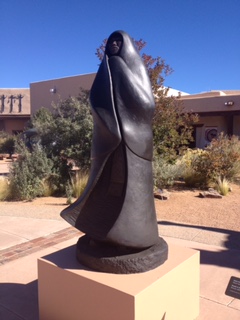 I have been tempted to whinge and to fuss about all the chaos that this summer has brought to my privileged life–change of service times, people traveling here and there, moving furniture, ripping up carpet, letting go of things no longer necessary to my life. My conversations with peers is often about how things are no longer the way they used to be–institutions, mores, conversational tones. Yet, almost immediately after I start down the road of hurts and slights, I am brought up short by pictures and stories of those who are really displaced. So many images make real for me the women, men and children without a place to go, no shelter in sight, no safe food or water available , all around the world. As I write this, the estimated number of displaced persons in Gaza is 250, 000.
I have been tempted to whinge and to fuss about all the chaos that this summer has brought to my privileged life–change of service times, people traveling here and there, moving furniture, ripping up carpet, letting go of things no longer necessary to my life. My conversations with peers is often about how things are no longer the way they used to be–institutions, mores, conversational tones. Yet, almost immediately after I start down the road of hurts and slights, I am brought up short by pictures and stories of those who are really displaced. So many images make real for me the women, men and children without a place to go, no shelter in sight, no safe food or water available , all around the world. As I write this, the estimated number of displaced persons in Gaza is 250, 000.
I have wrestled with this reality all week. How do I think about this? How do I pray for this? What I can I do in the face of this massive upheaval of human beings made in the image of the Holy One, and tragically like the Christ, have no place to lay their heads at night?
As I mull, muse and pray with these images, and the facts about refugees and immigrants, I keep coming back to these affirmations I find in Hebrew and Christian Scripture:
- Many of these sacred texts are written for and about people who are displaced, beginning with Adam and Eve a who are expelled from the Garden of Eden. The books of Genesis and Exodus are replete with stories of what it is like to be a wanderer. Many of the writings of Paul are sent to people who “have no permanent abiding place.” Yet the constant message to all those who have no place to abide is that the Holy One, the God who loved them into being, remains present to them, wherever they may wander, wherever they may go. I pray with fervor that the present days displaced have some sense of that accompanying, through relief workers, through faith communities, through one another.
- The call to those who for the moment have a place to dwell is a call to hospitality–to welcome the stranger, to care for the widows and the orphans. It is a call to open-heartedness for those who have been dispossessed, abandoned and wounded. Yet in the United States there is among some an angry resistance to that call, a protectionist rhetoric that claims that another human being’s suffering does no belong to us. The numbers of little ones who are caught in the cross-fire of politics is appalling, and for those of us who follow Christ, it is imperative that we act seriously to embody Christ’s direct directive for “the least of these,” which is to welcome the stranger, feed and give clothes, visit in prison. Our prayers need to have hands and feet on them, signifying our open hearts.
So day to day, I keep wrestling. I believe that God loves this world and all its people. I am called to offer hospitality–in my location I can send money to disaster agencies, pressure government leaders to take action, and to pray without ceasing.
But still I wrestle…and each time I am tempted to complain about the little displacements in my life, I can pray for those whose wretched displacements threaten their very lives, and ask once again for the Spirit to open my hospitable heart to the strangers that I am given















